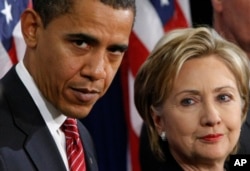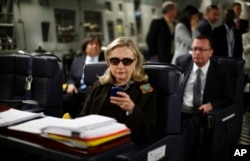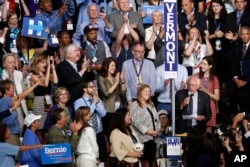“Although we weren't able to shatter that highest, hardest glass ceiling this time, thanks to you, it's got about 18 million cracks in it, and the light is shining through like never before, filling us all with the hope and the sure knowledge that the path will be a little easier next time.”
Hillary Clinton’s supporters applauded those lines in June 2008 despite their disappointment that she was dropping her bid for president and supporting Democratic nominee Barack Obama.
That “next time” came after two terms under President Obama, the first of which Clinton spent as his secretary of state, adding that experience to a resume that already included time as a U.S. Senator and as the nation’s first lady.
The 2016 race began with Clinton as the Democrat most widely assumed to win the party’s nomination. She made her candidacy official in April 2015 and really launched her campaign that June with a speech highlighting the need for equal opportunity, access to jobs and ending special privileges for a small few.
“I’m not running for some Americans, but for all Americans,” she said.
Challengers
She had two main challengers. Former Maryland Governor Martin O’Malley failed to gain any traction with voters, but Vermont Senator Bernie Sanders ignited a movement with his self-described democratic socialism that drew in huge numbers of young supporters.
Clinton’s front-runner status was clear in national polls that initially put her up by about 50 points, a gap that would close steadily as Sanders gained momentum.
“I think when you look back at it, it made Secretary Clinton a stronger candidate, the fact that there was a multi-month campaign that she had to wage against Senator Sanders who put forward very interesting ideas, who certainly galvanized a certain group of Democratic primary voters,” Democratic strategist Winnie Stachelberg told VOA.
Baggage
While her time at the State Department boosted Clinton’s foreign policy credentials, it also brought baggage that included a scandal involving her use of a private email system.
For the first 10 months of the campaign, Clinton had to deal with the distraction of periodic releases of her emails by the State Department and being called to testify in front of a congressional panel.
The Justice Department has said it will not be pursuing legal action against Clinton, but the issue hurt public perception of whether she can be trusted. Polls show a majority of voters view her – as well as Republican nominee Donald Trump – unfavorably. A CNN/ORC poll and a CBS poll both released Monday showed about 30 percent of voters think Clinton is honest and trustworthy.
“There’s concern about her answers, there’s concerns about the way in which she handled it, whether or not language was parsed and that goes into not understanding fully what occurred,” Democratic strategist Penny Lee told VOA.
But when the Democrats held their first debate in October, Clinton’s opponents showed no interest in making the emails a campaign issue.
“Let me say something that may not be great politics,” Sanders said. “But I think the secretary is right, and that is that the American people are sick and tired of hearing about your damn emails.”
Clinton admitted using the private email system “wasn’t the best choice,” but said the congressional committee investigating her was basically an arm of the Republican National Committee.
“She has admitted her mistakes and she is working hard to convey to the American people and to voters that she is trustworthy,” Stachelberg said.
The Sanders challenge
Just after the first debate, Clinton got a boost when Vice President Joe Biden announced he would not be joining the race, leaving her as the party’s biggest name.
At a debate in December, Clinton called Trump the “best recruiter” for Islamic State and criticized his plan to ban Muslims from entering the country. The comment was emblematic of a campaign that divided focus between her Democratic opponents and the leader of the Republican pack.
When voting in state primaries and caucuses began February 1 in Iowa, Clinton narrowly beat Sanders.
O’Malley was an almost non-existent third place and dropped out. That left Clinton and Sanders squaring off in a tense February 5 debate in which Clinton called herself a “progressive who gets things done,” while saying Sanders’ promises for free college and healthcare could not be kept.
A few days later, Sanders won the New Hampshire primary. That date, February 9, was the only day during the entire campaign that ended with him leading in the number of pledged delegates. Clinton grabbed a big lead on March 1 by winning the most states on so-called Super Tuesday, including delegate-rich Georgia, Virginia and Texas.
By March 15, Clinton had 58 percent of the pledged delegates. Sanders won a string of western states to cut that number to 54 percent, the most momentum he would muster. He won only six states in the final two months of voting.
Superdelegate edge
Clinton did not earn enough delegates to secure a majority, so she needed the support of the party officials known as superdelegates who are free to pick any candidate. They overwhelmingly chose her to the dismay of Sanders who decried the system as unfair.
“We must get rid of superdelegates,” he wrote on Twitter. “The fact that we had 400 superdelegates pledged eight months before the first ballot was cast is absurd.”
“This is his first time being a Democrat, and so his campaign I don’t think appreciated nor understood the rules,” Lee said, adding that some in the party will likely want to discuss possible changes after this cycle.
Sanders endorsed Clinton at a joint appearance on July 12, while some of his supporters remain staunchly opposed to her and say they will not vote for her.
“Hillary Clinton will make an outstanding president and I am proud to stand with her here today,” Sanders said.
Clinton is the first woman ever to be a major party nominee for president. She hinted at the importance of the milestone during that concession speech back in 2008:
“You can be so proud that, from now on, it will be unremarkable for a woman to win primary state victories, unremarkable to have a woman in a close race to be our nominee, unremarkable to think that a woman can be the president of the United States. And that is truly remarkable my friends.”
Elizabeth Cherneff contributed to this report.













